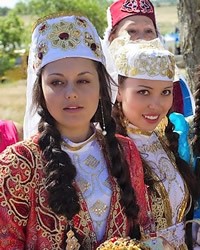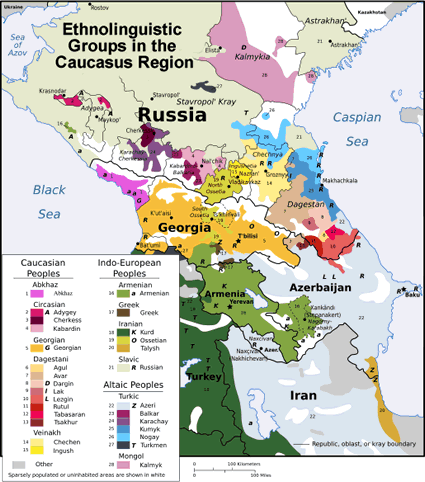Throughout history, Armenia has been a battlefield for many invaders and contending empires, and a bridge for many cultures and civilizations. During the past 2,700 years, Armenia has been conquered by the Persian Empire, Alexander the Great, the Roman Empire, the Byzantines, Arabs, Mongols, Tatars, Ottomans, Persians, and Russians. Armenian kingdoms, principalities, and even a short-lived empire (95-55 B.C.) managed to survive and thrive for some 1,700 years. Under various kings and princes, the Armenians developed a sophisticated culture, an original architecture, and their own alphabet.The 1905 Russian revolution and the 1908 Young Turk revolution raised the hopes of the Armenians for reform and an opportunity to build a homeland in historical Armenia. These hopes were dashed as the Ottoman and the Russian Empires fought each other during World War I. A dark hour of Armenian history is the Armenian genocide, which started on April 24, 1915. Some 1,750,000 Armenians were deported to Syria and Mesopotamia by the Ottoman authorities. Subject to famine, disease, and systematic massacres, most of them perished. This "ethnic cleansing" of the Armenians from their historical homeland led Raphael Lemkin, the father of the Genocide Treaty, to coin the new term "genocide" in the 1930s to describe the historical plight of the Assyrians and the Armenians as subjects of the first genocide of the 20th century. Armenia gained independence on September 23, 1991.Today, there are several million Armenians worldwide. Significant numbers are located in Armenia and the United States of America. Major diaspora centers of the Middle East are Iran, Syria, and Lebanon. There are also Armenian communities in some of the European countries, such as the United Kingdom.The Armenians brought their love for their nation and religion when they migrated to the UK and began to build the Holy Trinity Armenian Church in 1869. Their protests for peace in their motherland were not ignored when they opened the first Armenian Embassy in Europe in the UK in 1992. The Armenians in the UK migrated from Iran, India, Cyprus, and recently Armenia after the collapse of the USSR.
Today, Armenians in the UK continue to pass on the traditions of their nation to the diaspora through community organizations such as academic institutes, dance groups, choir, church groups, Sunday schools, scouts, committees that manage the different social events, and political groups that share the continuous troubles of their nation throughout the UK.With Europe's oldest Armenian community established in the UK, the diaspora continues to empower its culture by promoting cultural and educational initiatives. As families gather for community events hosted by large Armenian committees, they celebrate their heritage through traditional dances and songs, while also supporting charities that raise money for humanitarian aid and advocacy work.The Armenians in the UK are committed to strengthening connections worldwide to increase awareness of their country's ongoing political concerns. The Centre for Armenian Information & Advice (CAIA) has been operating since 1986. It provides essential services such as immigration, housing, health, welfare, and education for new arrivals, students, and the elderly. They have integrated but have not assimilated, keeping their Armenian identity.Armenians in the UK are well known for their academic excellence in science and surgery, with a leading professor as head surgeon at the Department of Health, symbolizing the community's significant contributions to life in the UK.
In 301 AD, during the rule of King Dirtad III, Armenia became the world's first Christian nation. A Christian monk, commonly known as Krikor Lusavorich or St. Gregory the Illuminator, cured the King of a disease. After this event, King Dirtad III was baptized and accepted Christianity as Armenia's official state religion. Before this, two disciples had brought Christianity to Armenia, St. Thaddeus and St. Bartholomew.Spiritually, Armenians are still Christian, but their faith in Christ has often taken the back seat to nationalism or a faith in their heritage. Every generation needs a fresh work of the Holy Spirit to move them to full devotion to Jesus Christ.
Armenians need the Holy Spirit to move in their families and their churches so they can enjoy the abundant life that only Jesus offers.
Pray for the Armenians in the United Kingdom to be salt and light to those who don't know the only Savior.Pray for spiritual peace; this is what Armenia needs most of all.Pray that God would bring revelation of Christianity as a spiritual relationship, and that Armenians would realize they can have joy and peace as they follow the Lord.Pray for their businesses to flourish as a testimony of God's power and goodness.Pray for God to open the eyes of the Armenians in the UK to come to saving faith.Pray for the Armenians to continue glorifying God in all their achievements.
Scripture Prayers for the Armenian in United Kingdom.
Middle East Resourceshttps://en.wikipedia.org/wiki/Armenians_in_the_United_Kingdomhttps://agbu.org/armenians-england/home-generations-armenianshttps://old.accc.org.uk/the-community/https://ancuk.org.uk/issues/uk-armenia-ties/https://mirrorspectator.com/2020/06/11/hard-hit-british-armenians-deal-with-pandemichttps://www.bammj2015.buprojects.uk/armeniandiaspora/the-armenian-diaspora-a-struggle-for-identityhttps://caia.org.uk/about-us
| Profile Source: Joshua Project |













